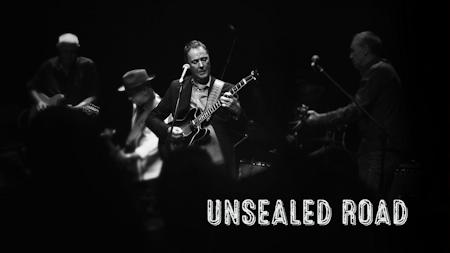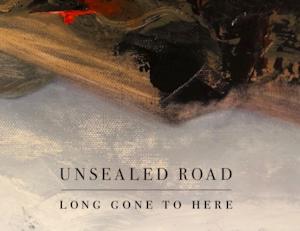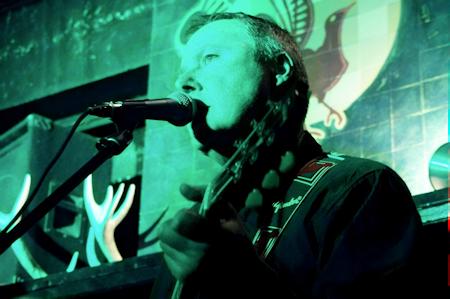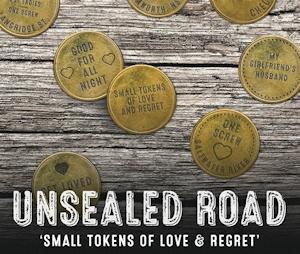DAVE'S DIARY - 4 MAY 2020 - UNSEALED ROAD INTERVIEW
PETE BURNS PATERNAL MEMORIES ON UNSEALED ROAD
UNSEALED ROAD
LONG GONE TO HERE (INDIE) - www.gyrostream.com
2019
“I'm back in Melbourne , back in my old town again/ and I'm back in black again/ they're sleeping rough in the world's most liveable town/ we don't see them if we don't look down.” - Black Clothes - Peter Burns
 |
Seddon singer-songwriter-teacher-mandolinist Pete Burns draws on almost seven decades of life on the cutting edge of suburbia, the bush and way beyond to fuel his second album of original songs under the wry title of Unsealed Road .
The 65-year old road warrior harvested hay for inspiration that began with his parents in Melbourne and rural retreats diverse as Hamilton and Shepparton.
Like many perceptive peers he exposes his influences in narcotic narratives and lonesome laments that have scored him exposure on ABC and community radio and TV.
Burns lyrical soulful roots country-folk and R & B is a new millennium extension of the seventies outlaw country of artists diverse as Saltbush and the Dead Livers.
The one-time Paris street busker proves worthy of exposure and success beyond our unlucky radio country with songs that connect on first listening.
Burns second album Long Gone To Here , produced by Shane O'Mara at his Yikesville Studio in Yarraville, followed debut 2015 album Small Tokens Of Love And Regret.
 |
Long Gone To Here arrived on my desk midst autumnal splendid isolation that has been a huge drama for all of us - especially the musicians who have no safety net beyond their muse and music. Black Clothes is an apt album entrée. It's set in Melbourne where the narrator paints a bleak picture of the plight of the homeless “sleeping rough in the world's most liveable town” while a busker plays Kelly, Cohen and Cave to an audience also clad in black clothes. |
It deserves a video clip and precedes morose lament Don't Say where combatants enjoy a warm bed - vast contrast to the chill of reality in the “colder light of day.”
But the mood is uplifted by The Window Seat where the narrator drives his belle to Tullamarine where she boards a flight to Houston in the deep south of the Lone Star State.
“This is mostly a work of fiction in terms of that relationship but I like an opportunity to namecheck stuff and build it into a story,” Burns told Nu Country TV .
“The storyline sort of wrote itself. I got the idea looking at a doco that featured Houston and viewed it at night from the air and it reminded me a bit of Melbourne 's skyline. A lot of my stuff chronicles love lost so its familiar territory.”
It segues into altruistic Sweep It All Up where the narrator sings of importance of maintaining old friends and being there to catch them if they stumble.
It's a sibling of sorts to Against The Blue (For Ross.)
“Ross is an old friend who I went to school with,” Burns revealed.
“He's lived in France for last 30 years and is a respected painter and photographer. He's also suffered from depression over the journey. I wanted to capture some painterly images and something Ross would relate to. He digs the song which is a relief. It was initially inspired by riding along the beach in winter in Williamstown and seeing ships in the fog like a Turner painting. That's Jack Howard from the Hunters on the ethereal trumpet part at the end of the track - obviously a huge Miles Davis fan.”
Smart sequencing finds the joyous Confident Woman before the philosophical In My Bed where the character regrets taking more than he gave in a relationship and not living up to the potential he once showed.
The punchline - his journey ends in a rented room where his view is “through a dirty window at next door's plumbing.”
Equally bleak is Something Must Give where victims of love and war drown in a pathos primed passion pit.
PETE'S PATERNAL PASSION SURVIVES
“Born between the wars, into a working-class family/ leaving school at 14, for a local factory/ at seventeen in 1945/ a young man knew, luck was on his side/ he had an easy charm, and it helped him, to find his feet/ wasn't much into books, it was people he could read/ he had a way of getting people on his side/ with Betty Day, he knew it was right.” - Bird Can't Fly (For Jim ) - Pete Burns.
 |
But the powerful peak of this album is Bird Can't Fly (For Jim ) - Burns tribute to his parents who enjoyed 61 years of marriage.
That journey survived job losses in a variety of towns and ended at home in Rosebud when Jim was 85 on the eve of being admitted to a nursing home with his wife Betty.
“My father was 17 at the end of WW2,” Pete fondly recalled.
“A child of the great depression he nonetheless got lucky with his timing by avoiding the war. Luck is a bit of a theme in this song, he met and married the right girl and considered himself lucky in life. A working-class Melbourne boy who grew up in Richmond and Collingwood. After marriage he moved to Shepparton and then Hamilton for work where myself and my siblings grew up. We returned to Melbourne (also for work) and he and mum eventually retired in Rosebud. I guess it's the story of an ordinary life well lived. He died at 85 in their Rosebud house the day before he and Mum were due to move to a nursing home - a fate he would have hated so he got lucky again! He loved a drink and had a saying “bird can't fly on one wing” when pouring additional glasses of Muscat or Port at the end of a night.”
Equally memorable is positive passion in Accidental Beauty where the character mines melancholia and finds the golden girl of his dreams.
Burns narrator also seeks romantic redemption in It's Got Some History and his fatalistic finale Population of 2.
So that's a short summary of some sources of Long Gone To Here.
Producer O'Mara guested on guitar and percussion with Burns band members - violinist Richard Moore, bassist Mick Robbins, guitarist Michael Bright and drummer Mike Glenn.
Jack Howard also added trumpet and flugelhorn, Bruce Haymes keyboards and David Halliwell harmonica with vocal cameos from Helen and Andrew Patterson and Shelley Scown.
So, you're wondering what Burns also did in his journey - here's a short summary in his own words.
“I've worked in Logistics since I finally got a real job in my mid-30s, driving forklifts etc,” Burns confessed.
“I eventually went back to university and ended up running those big distribution sheds that you see on the fringes. I'm still involved, now teaching - worked a bit at Victoria University and RMIT, now teaching logistics online as a sessional. I've always considered music, writing to be my main gig but having kids and a mortgage forced the reality given I've never made much from music. It's tough if you're not playing covers and no good at promotion! I did several years in my 20s busking in Paris and still have old mates doing that. I basically played the Dylan songbook back then and we still drop in a couple of covers from old favourites like J.J. Cale, Jimmy Webb, Ron Sexsmith, Jason Isbell etc.”
Burns also recorded an acoustic disc between albums with Rich Moore who sings harmonies on Unsealed Roads albums and plays fiddle and acoustic guitar.
“I did it at Shane's studio so its reasonable production but quite basic,” Burns confessed.
“I ended up re-recording a couple of tracks from that record for Long Gone to Here .”
UNSEALED ROAD
SMALL TOKENS OF LOVE & REGRET
2015
WILLIAMSTOWN, COLLINGWOOD, SALTWATER AND TAMWORTH
“Down on Langridge Street/ it's the first place that I saw ya/ as you walked towards the bar/ I had you pegged for water/ but a beer was what you ordered/ first day in Collingwood/ Yorkshire Stingo Hotel , late summer Saturday.” - Langridge Street - Pete Burns.
 |
Unsealed Road kicked off their 2015 album with Williamstown - a collage of images and memories from the bayside suburb - a frequent pit-stop on Burns journey. “I love Williamstown, it inspired a couple of songs just riding my bike down there,” Pete recalled of the 14-song disc entrée. “It's told from the point of view of a guy in jail reflecting on what he's missing.” Burns revisits jail in My Girlfriend's Husband where the male fears retribution after a steamy affair with the wife of a prisoner, about to be released after three years. |
“It was based on a betrayal of sorts but the prisoner angle was just a vehicle to make it funnier, more interesting,” Burns revealed.
“It is a bit like a classic Western, sex, violence, retribution, fear, cowardice and self-preservation - all the usual ingredients.”
Burns punctuates his behind bars imagery with a poignant portrait of Footscray and its growth from working-class dormitory suburb to cultural oasis, replete with Chinese temples, cafes and bars in Saltwater River .
He explores ghosts of empty factories and racetrack upstream on the banks of the Maribyrnong river where he once roamed in his youth.
“The song is told from the point of view from an old man who sits and watches the Maribyrnong river reflecting on his life,” Burns revealed.
“It also ticks off Footscray's gentrification and its former reputation, shamelessly name checking AC-DC “where dirty deeds are done dirt cheap”.
Pete's personalised passion in the reality romance of Langridge Street and Not Always On Show are torn from the pages of his union with wife Catherine Floy.
“She was a backpacker from London who had just rented a room in a house over the road from the Stingo in 1990,” Burns confessed.
“We spent most of the summer together and she then flew home to care for a family member. She came back out six months later and moved in with me and we applied for her residency. Our sons Bill and Brendan, now 19 and 21, came 10 years later. We finally married in New York a few years ago! She initially did office work then studied to become a social worker, now works for St Vinnies. She also inspired Not Always on Show .”
The latter song praises virtues of a natural beauty who places social conscience and humanity way above faux facial factors.
UNSEALED ROADS BEYOND TAMWORTH
“There's an unsealed road leading from the edge of town/ to a humble little shack about 15 miles down/ and that bone jarring ride/ is worth it in the end/ cause me and this old troubled soul, we're back on the road.” - Unsealed Road - Pete Burns
Burns injects personal experiences into the weather metaphor of Perfect Winter , biblical imagery in Put The Iron In The Fire and another plane reference in Get Loved.
He also explores diverse shades of loving and leaving in Trumpets & Guitars , regret in Sunday Streets (The Longest Day ) and romantic redemption in If She Only Will.
Equally memorable is Unsealed Road - the song that inspired the band's name.
So, what was that dual source?
“That's a great question,” Burns conceded.
“I had the band name first, wanted something to reflect the Alt-country vibe we went for earlier on. Not sure why but I later decided there was a song in it and based it around the idea of someone getting out of the city to repair themselves. But I think you're right about growing up in regional towns.”
It was a different journey on the bitumen bliss of the Newell Highway that ended in his song Tamworth.
“Cath and I made it once to Tamworth , pretty early on,” Burns recalled.
“We flew to Sydney , hired a campervan and drove up the New England Highway to the festival. I was obsessed with singers like Hank Williams and Dwight Yoakam at the time. I saw loads of buskers having a crack there and I'd also spent years busking so that informed the song. However, I didn't busk there. I loved the vibe there and also saw Chad Morgan which was a highlight, also Johnny Green's Blues Cowboys ! Subsequently a friend who I played with in a band in Melbourne later took that song to the festival and won best new act in a competition there. I always hoped I could sell it to an Aussie country star like Lee Kernaghan or Troy Cassar Daly but never had the confidence to try my luck.”
Albury and Grafton were launch pads for Lee and Troy.
So, the salient sequencing of Tamworth before the album finale Permission To Play The Blues seems serendipitous and prophetic long before these turbulent times.
Check out these lyrics - “bad news in the paper, bad news on the screen/ people say it could be the worst we ever seen/ all that anger and bloodshed washes over me/ and I can't forget you now there's nothing left to fear.”
But there's light at the end of this autumnal tunnel.
The Unsealed Road albums are available at Basement Discs in Melbourne CBD and GYROSTREAM - Queensland based distributor.
Burns is also organising digital release of both records soon.